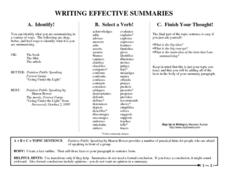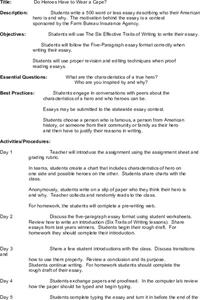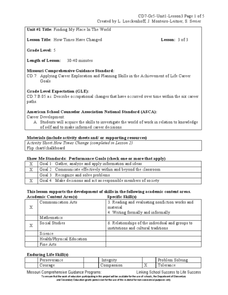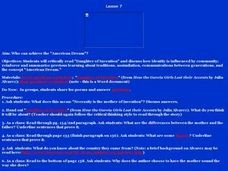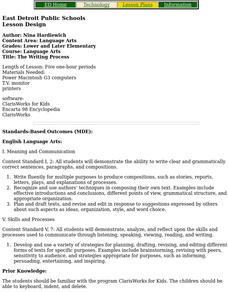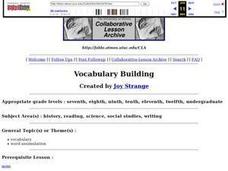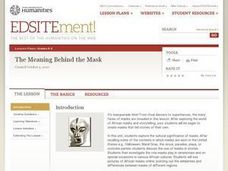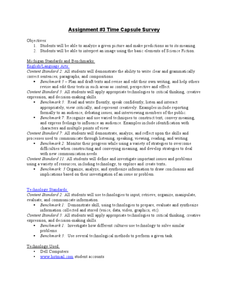Museum of Tolerance
Immigration Journeys
Through the journey of four stories of immigration, scholars complete graphic organizers and apply knowledge to create a visual representation of their findings on a large poster. Third and fourth readers write a letter to their family...
Museum of Tolerance
Music Evokes Memories and Emotions
Dim the lights, take a deep breath, and press play to explore the emotions and memories that music elicits. Class members begin using relaxation techniques designed to create a positive listening experience. As music plays, learners...
Curated OER
Developing Student Web Pages for Showcasing Research
Students employ information literacy skills to research topics. They develop topics using a graphic organizer. They draft, revise and edit research projects. They write an expository essay. They create a web page in Microsoft Publisher.
Curated OER
Informative Essay Writing
High schoolers start by drawing Mr. Essay Man, who is supposed to illustrate the different parts of an essay. After discussing what each component should contain, writers start their essay, guided by the teacher and class discussion....
Anchorage School District
Writing Effective Summaries
Drafting a strong first sentence for a summary is an important step. Writers can use the formula presented on this handout to get started. The resource lists three steps to put together a strong topic sentence, as well as tips and hints...
Blinn College
The Writing Process
Lead your learners through the different stages of the writing process. Show them this presentation as they work through a writing assignment, breaking it up over several days of work. You might also post this on a class website as a...
Curated OER
Counting Sentences' Words
Explore language arts by completing a worksheet with class. They read the story Owl Moon and discuss the rhythm of the writing and how action verbs are used appropriately. Then complete a writing worksheet which discusses writing...
Curated OER
Echinacea No Cure all for Kids
Students look at real data and answer the question of whether or not they would recommend Echinacea to cure a cold. In this investigative instructional activity students describe whether the data supports the hypothesis that echinacea...
Curated OER
Writing the Newspaper Article
The class reads several newspaper articles and analyze them for purpose, style, tone, length and organization. They interview each other about important events in their lives and write journalistic articles.
Curated OER
Can You Get the Signal?
What is a signal word? Recognizing these words is an important step in both reading and writing formal text. Review a list of signal words (provided and organized into specific categories), and then have your class play a game to...
Curated OER
Do Heroes Have to Wear a Cape?
Young writers choose a person from American history, their community, or their family to use as the subject of a persuasive essay. The process begins with a discussion of the characteristics of a hero, the completion of a prewriting web,...
Curated OER
THE TRIANGLE INEQUALITY IN ANIMATION
Students open up the script to generate the sketch. They examine the viewing of the animation of a triangle. Students incorporate writing skills across the curriculum within this lesson.
Curated OER
How Times Have Changed
Fifth graders work in small groups to compile job changes. They use data from the list of changes that the group generated together. Students analyze the data to determine: categories of changes, patterns or trends of changes, and future...
Curated OER
Who Can Achieve the "American Dream"
Exploring the idea of working to achieve the American Dream, the class reads an excerpt from How the Garcia Girls Lost their Accents by Julia Alvarez. Following, the class analyzes the excerpt and discusses the theme of the reading using...
Curated OER
Peer Editing Form
Save time by downloading a template for peer editing. Included, you will find a one-form-per-page format and a four-forms-per-page format.
Southern Nevada Regional Professional Development Program
Common Core Reading Standards: Understanding Argument
What does your class know about logical fallacies? They can find out quite a bit and practice identifying logical fallacies if you follow the steps and use the resources provided here! After reviewing ethos, pathos, and logos, ask small...
National Center for Case Study Teaching in Science
A Case Study of Memory Loss in Mice
Using a short news article, high school or college biologists examine the scientific method in practice. The article, which focuses on an Alzheimer's experiment performed on rats, has very limited information, so learners must be able to...
San Bernardino Co. Supt. of Schools
Was Julius Caesar a Good Leader for Rome?
Learners consider the various perspectives that different groups in Roman society may have had for Julius Caesar, such as Roman soldiers, senators, the working class, and slaves. The primary activity involves a reading of Caesar's...
Curated OER
The Writing Process
Show your young researchers how to find information, brainstorm a topic, map or outline their own stories, and create rough drafts. This lesson also shows learners how to peer edit, conference with the teacher, and write their final...
Curated OER
Vocabulary Building - Declaration of Independence
Young scholars read the first part of the Declaration of Independence and mark the words they don't know. First, they try to guess what the words mean by looking at the them in context, and then they look up the words in a dictionary.
Curated OER
The Meaning Behind the Mask
Students explore the world of African masks and storytelling. They create masks that tell stories of their own.
Curated OER
Time Capsule Survey
Here's a fun way to incorporate technology into your curriculum. E-mail each of your class members a picture and 10 questions about the photo. Individuals then imagine the story behind the image and e-mail back their responses. Although...
Curated OER
Narrative Nuts and Bolts
After viewing slides and reading about child labor, young authors compose an original narrative story. They practice note-taking skills and work to effectively engage a reader by incorporating plot, logical order, complex characters,...






